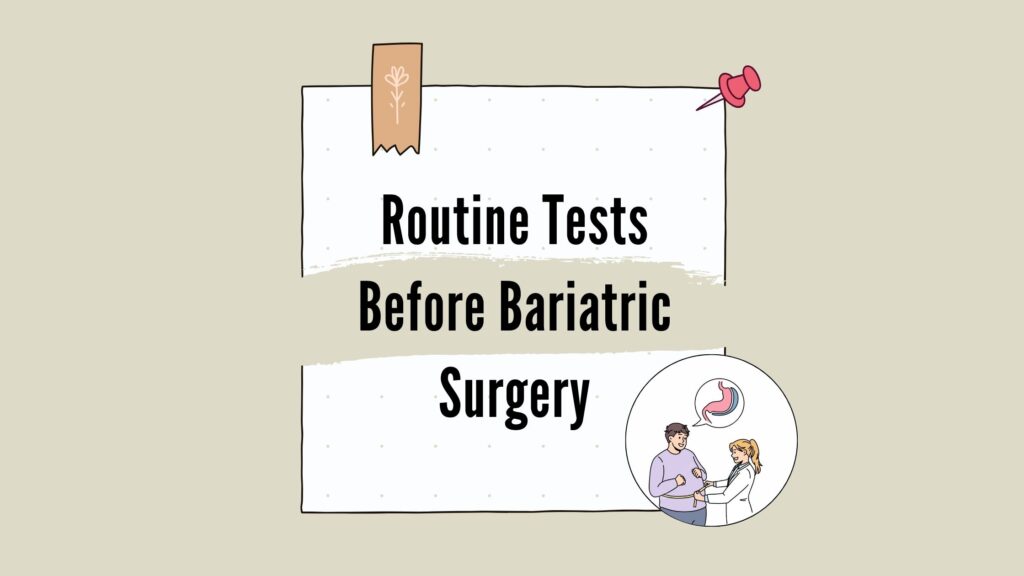Routine Tests Before Bariatric Surgery

Bariatric surgery can help you overcome old habits so you can lose extra weight and become a healthier you and it also reduces the risk of possibly life-threatening weight-related health problems, including:-
Certain cancers, including breast, endometrial and prostate cancer.
Heart disease and stroke.
High blood pressure.
High cholesterol levels.
. Non-alcoholic fatty liver disease (NAFLD) or non-alcoholic
steatohepatitis (NASH).
Sleep apnea.
Type 2 diabetes.
To determine your suitability for bariatric surgery, your doctor will conduct a comprehensive review of your medical history. They will inquire about any pre-existing conditions, previous surgeries, or medications you are currently taking. Additionally, they will evaluate your weight loss attempts, including diet and exercise regimens, to understand your previous experiences with managing your weight.
Before undergoing bariatric surgery, medical professionals conduct a series of essential medical tests to assess your overall health, determine your suitability for the surgery, and ensure a safe and successful outcome. From initial consultations to detailed evaluations and diagnostic procedures, understanding these tests will help you navigate the process with confidence and prepare yourself physically and mentally for the journey ahead. These assessments serve as a crucial foundation upon which the entire surgical plan is built.
List Of Test Before Surgery -
1. Blood Tests
Blood tests are essential for assessing a patient’s general health and identifying any underlying medical conditions that might impact the surgical procedure. The following blood tests are commonly performed:
Complete Blood Count (CBC): This test measures various components of the blood, including red and white blood cells, platelets and haemoglobin levels to identify any blood disorders or anaemia.
Lipid profile: Lipid Profile which measures cholesterol and triglyceride levels to assess cardiovascular health. These fats are important for cell health, but they can be harmful when they build up in the blood.
Thyroid Test: Thyroid Function Test which measures thyroid hormone levels to assess thyroid function and detect any disorders affecting metabolism.
Liver Function Tests: Obesity can lead to fatty liver disease, which may necessitate a closer examination of liver function to ensure safe surgery.
Vitamin and Mineral Levels: Deficiencies in essential nutrients like vitamin D, B12, and iron are common in obese individuals. Addressing these deficiencies preoperatively can improve the surgical outcome and reduce postoperative complications.
2. Imaging and Diagnostic Tests
Imaging and diagnostic tests are another essential part of the evaluation process before bariatric surgery. These tests provide detailed information about your internal organs and help identify any underlying conditions.
Chest X-ray: This test evaluates the health of your lungs and helps identify any respiratory issues that may impact the surgery.
Abdominal Ultrasound or CT Scan: These imaging studies can provide a detailed view of abdominal organs, helping to rule out any anatomical abnormalities.
Electrocardiogram (ECG): ECG measures the electrical activity of the heart and can reveal any abnormal rhythms or signs of heart disease.
Echocardiogram: If indicated by risk factors or the ECG, an echocardiogram provides detailed images of the heart’s structure and function.
Stress Tests: For patients with a history of heart disease or significant risk factors, stress tests assess how the heart responds to physical activity.
Dobutamine Stress Echocardiogram (DSE): Dobutamine stress testing is commonly used to evaluate overweight or obese patients with known or suspected CAD who are unable to exercise. Dobutamine is put in a vein and causes the heart to beat faster. It mimics the effects of exercise on the heart.
Pulmonary Function Tests (Spirometry): Obesity can lead to respiratory issues, so assessing lung function is crucial. These tests measure lung capacity and can detect conditions like obstructive sleep apnea (OSA).
Sleep Study: If you are suspected of having sleep apnea or other sleep disorders, a sleep study may be conducted to diagnose and address these conditions before surgery.
Venous Doppler Test: Venous duplex ultrasound is done in obese patients before undergoing bariatric surgery to find out any blood clots or poorly functioning valves in your leg veins, which can cause blood or other fluids to pool in your legs, known as venous insufficiency. And it may also help to check for injuries to your arteries or to monitor certain treatments to your veins and arteries.
3. GI Evaluation
Patients who have significant gastrointestinal symptoms such as upper abdominal pain, heartburn, belching sour fluid, etc., may have underlying problems such as a hiatal hernia, gastroesophageal reflux or peptic ulcer. For example, many patients have symptoms of reflux. It is important to identify these changes so a suitable surveillance or treatment program can be planned.
Upper Gastrointestinal (GI) Endoscopy: This procedure involves inserting a flexible tube with a camera into your stomach and esophagus to examine the structures and identify any abnormalities that may any additional interventions.
Abdominal Ultrasound or CT Scan: These imaging studies can provide a detailed view of abdominal organs, helping to rule out any anatomical abnormalities.
Aastha Bariatrics is recognized as a Centre Of Excellence (COE) for Metabolic and Bariatric surgery, underscoring our commitment to providing exceptional care to every patient throughout their entire surgical journey. As a centre of excellence, these routine test protocols are strictly followed here and we offer an extensive array of pre-surgery testing facilities tailored specifically for bariatric procedures. Additionally, our dedicated team provides comprehensive guidance and support to patients, ensuring they receive the utmost care before and after surgery. We prioritise the well-being and safety of each individual, striving to make their experience as comfortable and successful as possible.
Read also; The Cost of Bariatric Surgery in India
Why We Are?
- Asia's Trusted Bariatric Center
- Centre of Excellence
- Patient Trusted Highly Volume Bariatric Center in Mumbai
- EMI, Cashless & Mediclaim Facilities are Available
- Daily Patients Follow-up after Bariatric Surgery
- Patient Support Group Every Month
- Obesity Awareness Program
- Available with Latest Technologies
- 18+ Experience in Weight Loss Bariatric Surgery
- 300+ Weight Loss Diet Plan & Recipes
- Highly Trained & Experienced Bariatric Nutritionist
- Patient WhatsApp Chat Group
- & Many More
Medically reviewed by Dr. Manish Motwani, Bariatric & Metabolic Laparoscopic Bariatric Surgeon — Curated by Akansha Mishra







